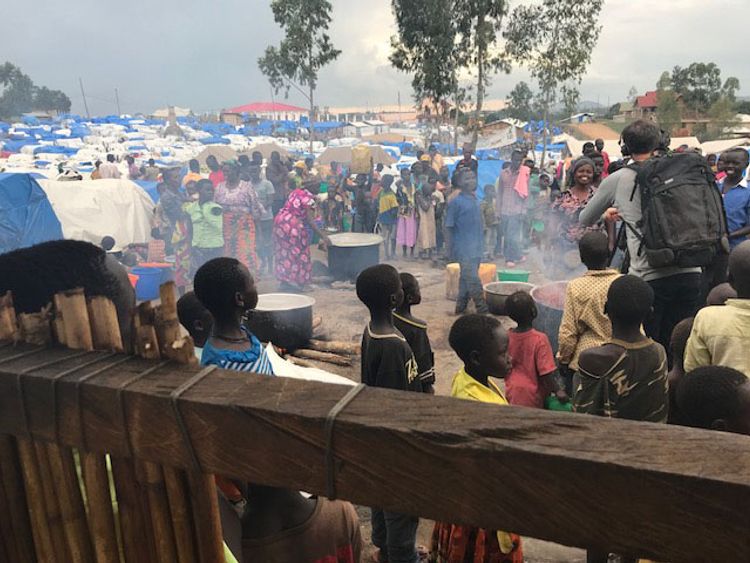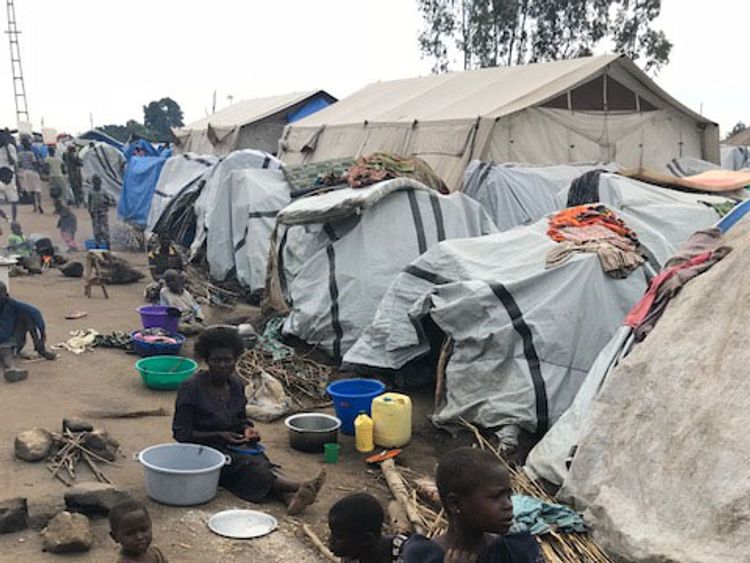It’s difficult to imagine the circumstances in which a man could hack a two-year-old’s face with a machete or what would drive him to do it.
But Rochelle’s extreme youth didn’t spare her from the anger and rage of the militia who stormed her village in Ituri Province in the Democratic Republic of Congo last month.
Her face has a deep scar stretching across it, just missing her left eye and there is a wound on the top of her skull where her attacker had another go with his machete.
How she survived is a testament to the bravery of her father, Richard Mynei, who is standing protectively behind her as we meet them.
He had already seen his wife hacked to death in the village of Che where they lived.
It was pitch-dark and the family – like everyone in the village – had been asleep when the attackers stormed their community.
In the mayhem and panic which followed, the men started slashing at his youngest child.
Richard intervened, fighting with the militia as they swung their machetes around, hacking at his head and his neck, slashing his lower back.
His eldest daughter, Mave, began running but two of the men managed to outrun the 11-year-old, chopping at the back of her head and neck and slicing her collar bone.
“They cut me like someone who was trying to kill a goat,” she tells us. “Then the second one came and just roughly cut my hand.
“These people are bad they just wanted to kill me.”
She holds her left hand tenderly.
The limb below the elbow has gone.
The stump she has been left with is still a mass of stitches covered in purple medication to stop infection.
The only child left uninjured is four-year-old Francine who appears to be the mother figure for her little sister.
She lifts the toddler up onto her hip as Rochelle begins crying.
The Mynei family are joined by nearly 10,000 people who have fled fighting and are now living in a squalid camp in Bunia.
They live in a rickety shelter built with thin bamboo reeds and covered with plastic, part of the Democratic Republic of Congo’s growing number of internally displaced people scattered across the country.
DRC now has more 4.5 million who have fled their homes from fighting – the largest number on the African continent.
The terrified people talk about their homes being destroyed or set on fire.
They talk repeatedly of gangs of militia storming their communities armed with machetes, guns and arrows, driving them away.
The government line is that it is an old ethnic conflict between the Hema and Lendu tribes, but most suspect it is stoked by an unpopular and autocratic government led by President Joseph Kabila, who has exceeded his mandate and is now under growing international pressure to step down and hold elections.
The DRC authorities are getting increasingly impatient with the negative murmurings from outside the country about the worsening situation and the growing humanitarian crisis.
There have been angry outbursts from several ministers about how the international community is exaggerating the statistics to besmirch the name of the DRC.
The DRC government has already said it will be shunning an aid donor conference scheduled for 13 April, during which attempts are going to be made to raise millions in aid to help DRC’s starving.
For the Mynei family, the politics is beyond them.
They – like the estimated 13 million other people in need of help – are just trying to survive and Richard’s face is the picture of stunned misery.
Remarkably though, he still regards himself as lucky.
“I feel so bad,” he says, “But praise God, all my three daughters survived.”
From – SkyNews






